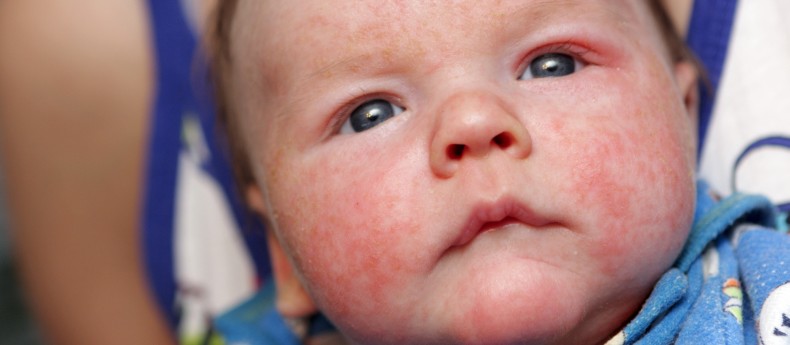
Eczema: An Itchy Mystery
About 10-20% of infants and 3% of adults have a skin condition known as eczema or atopic dermatitis. The direct translation of eczema in Chinese – “oozing rash” – is a vivid description of what this condition can look like during an acute flare-up. The condition typically manifests in children as oozing or crusting skin on the scalp and face, very dry skin, a reddish face and tiny bumps and crusts on the bends of elbows and back of knees. In adults, thickened skin on the back areas of the hands and top of feet is more common; the condition can also be extremely itchy. After an acute flare-up subsides, patients usually experience a long chronic period during which the skin looks dry and patchy.
Fortunately for most young patients, relief comes gradually by around their 10th birthday. Still some are not fortunate and will suffer from eczema into adulthood. Patients with the condition almost always have immediate family members (father, mother, brother, or sister) with a history of asthma, hay fever, other allergies, or eczema. Winter and spring are usually the peak seasons for acute flare-ups, as cold, dry air and pollen are common triggers that lead to patients getting worse and nonstop scratching due to itchiness; sometimes serious infection from bacterium or virus may also occur.
Although we do not know the exact cause(s) of eczema, we do know that the immune system of patients with eczema will overreact to certain irritations. Over time many patients can figure out the triggers which make their situation worse. Common factors which exacerbate eczema include hot or cold stimulation, detergent, animal hair, dust, pollen, some metals, synthetic fibers and some foods high in protein; stress and hormone changes are further possible factors in adult patients. For young patients, it is highly recommend their parents pay close attention to their diet and surrounding environment to understand what factors aggravate their child’s condition.
Eczema is not contagious, but it cannot be cured. The etiology of eczema is very complicated and as a result we cannot “treat the cause” – only the symptoms can be controlled. Here are some tips for patients to lessen the chances of an acute outbreak:
- Avoid sudden changes in temperature or humidity.
- Arrange activities outside according to the air quality.
- Avoid overheating or sweating.
- Avoid foods which may cause a flare.
The most important thing sufferers of eczema can do is to apply moisturizer daily to keep the rash in check. Research shows that the protective function of skin barrier is enhanced when the humidity of the skin increases. It is recommended to apply the moisturizer after a bath (water temperature ~38 centigrade and duration less than 10 minutes). Use a towel to pat the skin half dry, and then apply the cream (lotion is not recommended) on the palms to smear it evenly over the whole body. For young patients, their parents should help them apply a gentle, fragrance-free moisturizer daily. Consistent use of moisturizer should bring noticeable relief for most eczema symptoms.
Reference:
Copyright United Family Healthcare 2018 All right reserved ICP 京ICP备13017554号-4



